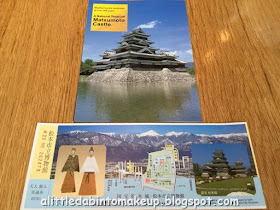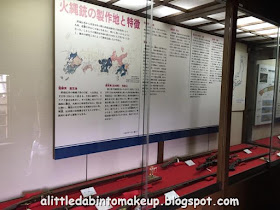C., A., hubby, and I got off the bus at Matsumoto Station at around 2pm. All of us were still stuffed from the big ryokan breakfast and decided to skip lunch. Instead, we helped C. and A. stash their luggage in a coin locker (love traveling in Japan for things like this!) and sort out their shinkansen tickets to the next destination.
They were heading on to Kanazawa, a recommendation I'd made based on how much A. loves zen gardens and Japanese gardens in general. After all, Kenroku-en of Kanazawa is one of three most famous gardens in all of Japan. In fact, if time permits I'd like to do a blast-from-the-past series and post about my Japan travels as a JET way back in 2005-2006. With all of its ups and downs, that single year changed my life and kept me (and hubby!) going back to Japan again and again.
Anyway, it was about 2:30pm when we were pondering what to do with the rest of our afternoon. I proposed Matsumoto Castle, which had been pretty high on my to-see list. Matsumoto along with Himeji and Kumamoto Castles are three of Japan's most famous castles (yes, they love top 3's rankings over there).
One of the reasons being that while the vast majority of castles in Japan had been destroyed and rebuilt, Matsumoto, Himeji, and Kumamoto have somehow survived one calamity after another, wars, earthquakes, urban development, world wars, etc. I believe these are the only three castles in Japan that have retained their original structures in parts or in whole. Sadly, Kumamoto did sustain more damages from the April 2016 earthquakes, and for a while the Kumamoto government discouraged tourism to the castle and prefecture as a whole until repairs and rebuilding efforts are completed.
They were heading on to Kanazawa, a recommendation I'd made based on how much A. loves zen gardens and Japanese gardens in general. After all, Kenroku-en of Kanazawa is one of three most famous gardens in all of Japan. In fact, if time permits I'd like to do a blast-from-the-past series and post about my Japan travels as a JET way back in 2005-2006. With all of its ups and downs, that single year changed my life and kept me (and hubby!) going back to Japan again and again.
Anyway, it was about 2:30pm when we were pondering what to do with the rest of our afternoon. I proposed Matsumoto Castle, which had been pretty high on my to-see list. Matsumoto along with Himeji and Kumamoto Castles are three of Japan's most famous castles (yes, they love top 3's rankings over there).
One of the reasons being that while the vast majority of castles in Japan had been destroyed and rebuilt, Matsumoto, Himeji, and Kumamoto have somehow survived one calamity after another, wars, earthquakes, urban development, world wars, etc. I believe these are the only three castles in Japan that have retained their original structures in parts or in whole. Sadly, Kumamoto did sustain more damages from the April 2016 earthquakes, and for a while the Kumamoto government discouraged tourism to the castle and prefecture as a whole until repairs and rebuilding efforts are completed.
Back to Matsumoto Castle, visit its official website for in-depth information (in English!). We were worried it'd be far away but it turned out to be a mere 15 minutes walk north of the station. So off we went, and boy oh boy it was utterly worth the trip and back. I mean, look at this beauty in her original splendor, the Dark Raven to Himeji's White Heron! I swooned.
As expected, there was a huge line to get in, and no shoes were allowed inside of course. They provide a nylon grocery bag at the entrance for everyone to carry their shoes along.
What was unexpected was how pleasant it was inside the castle itself. It was hot out that day (though not as bloody hot as Kyoto, I'll tell you that right now), and we all were sweaty and bracing ourselves to go through an oven along with the hordes of tourists. To our great surprise the castle interior was rather dry, cool, and breezy, thanks to the amazing architecture feat that allowed for effective ventilation despite the hot and humid summer and the crowds! Duly impressed.
Going up higher to see many of the original items from the castle (nails, roof tiles, weapons, etc.) on display.
Note how steep this staircases was (left). Almost every single one of these staircases was that steep, if not steeper. Consider the average height at the time (~159cm/5'2.5" average), climbing these stairs could be quite literal for some. Add in the clothing back then for both men and women, I do wonder if tripping on one's layers of long and weighty kimono and come tumbling down the stairs was a common occurrence. Sorry if that ruins your romantic image of Japanese castle life, just being practical here ^.^ Why on earth would they build stairs so steep and hazardous?!?
Also, check out these columns. Notice how the left column had this odd marbling while the right one was smooth? That's because the left column was an original, when they were still chopping the wood instead of sawing it. The right column was probably a later replacement. The wood came from tsuga (hemlock tree), spruce, and fir trees.

No, these aren't ventilation windows, though they might as well be. These are actually embrasures and arrowslits, from which hot oil or boiling water would be poured (upper left), arrows would be shot (upper right), and muskets would be loaded, aimed, and fired (bottom two) in defense in case of a castle siege. Good times. Good times. (Just so we're clear, I'm being sarcastic...)

And these aren't windows either, though again they might as well be. They're for samurais and soldiers to stick out their katanas and yaris to dispatch any scaling attackers. I do think those of us who reminisces about the "golden past" do so in the luxury of a safe and modern present.

More castle artifacts, including a large collection of muskets. Here's the "dolphin" roof ornament (left), and a talisman against fire (right) once adorned the castle's main gate.
How to kneel and aim with one's sake-belly out of the way.
View of castle back exit from the 3rd floor.
Lots and lots of guns and some armors.
This post is getting too long so I'm moving the rest to a second post ^.^

















































No comments:
Post a Comment